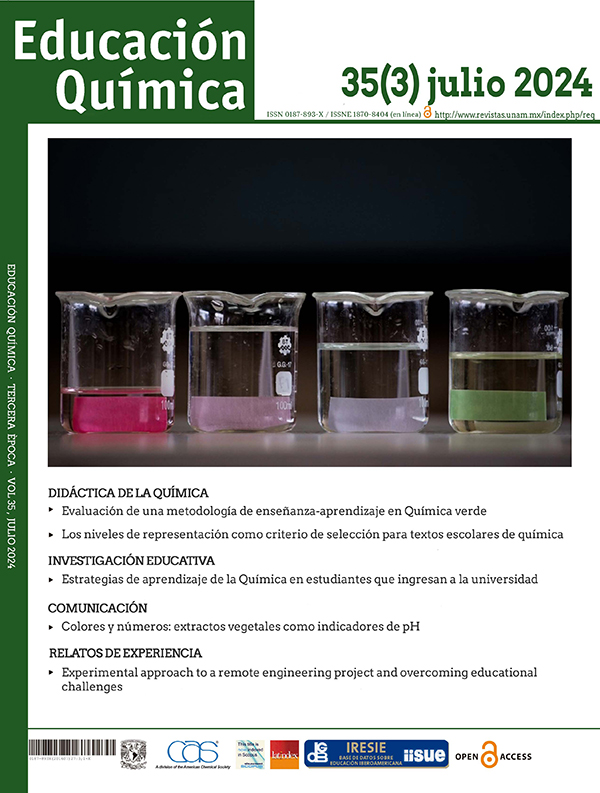Effect of a contextualized strategy in teaching mass and volume units
Main Article Content
Abstract
The research addressed the lack of proficiency in mass and volume unit conversions among second-year high school students through a contextualized strategy. The aim was to analyze the impact of the strategy on the students’ understanding of the mentioned units. It was employed an experimental methodology with a constructivist approach. The strategy included diagnostic assessments, design and implementation of the strategy, and subsequent evaluations. The results showed a significant increase in students’ average knowledge. The normality test confirmed a normal distribution of the data. The student’s t-test revealed significant differences between the results before and after the intervention, supporting the alternative hypothesis that the implementation of the contextualized methodology enhances the comprehension and application of mass and volume unit conversions. The findings demonstrate the effectiveness of the strategy in improving chemistry learning-teaching process and underscore the importance of integrating everyday contexts into teaching to promote meaningful and lasting learning, as well as the significance of the proposed methodology being applicable to the study of other chemistry topics and subjects.
Article Details
Citas en Dimensions Service
References
Abu-Bader, S. H. (2021). Using statistical methods in social science research: With a complete SPSS guide. Oxford University Press, USA.
Alban, G. P. G., Arguello, A. E. V., & Molina, N. E. C. (2020). Metodologías de investigación educativa (descriptivas, experimentales, participativas, y de investigación-acción). Recimundo, 4(3), 163-173.
Álvarez-Risco, A. (2020). Clasificación de las investigaciones.
Ausubel, D. (1983). Teoría del aprendizaje significativo. Fascículos de CEIF, 1(1-10), 1-10.
Benítez-Vargas, B. (2023). El constructivismo. Con-Ciencia Boletín Científico de la Escuela Preparatoria No. 3, 10(19), 65-66.
Broman, K., Bernholt, S., & Christensson, C. (2022). Relevant or interesting according to upper secondary students? Affective aspects of context-based chemistry problems. Research in Science & Technological Education, 40(4), 478-498.
Cabrera-Tenecela, P. (2023). Nueva organización de los diseños de investigación. South American Research Journal, 3(1), 37-51.
Cedeño, A. A. Q., & Pita, Y. N. (2021). La enseñanza de la química: Necesidad de un fortalecimiento y comprensión en estudiantes de bachillerato. Revista Oratores, 13-23.
Cepeda, S. B. (s. f.). La tienda como ambiente de aprendizaje para el fortalecimiento del pensamiento numérico en estudiantes de grado Cuarto de la IED La Concepción de Bogotá.
Chonillo-Sislema, L., Heredia-Gavin, D., Chayña-Apaza, J., Ramos-Pineda, Z., & Sánchez-Solórzano, J. (2024). Dificultades en el aprendizaje de química en el bachillerato, desde la opinión del alumnado y algunas alternativas para superarlas. Revista Innova Educación, 6(1), 71-88.
da Silva Peres, N. (2020). Enseñanza de la química: un aprendizaje significativo contextualizado. Copérnico, 17(33), 86-86.
Espinoza-Pajuelo, L. Á., & Ochoa-Pachas, J. M. (2020). El nivel de investigación relacional en las ciencias sociales. Acta jurídica peruana, 3(2), 93-111.
Faneite, S. F. A., & Barrios, M. (2023). La enseñanza contextualizada para el aprendizaje de las Ciencias Naturales. Revista de la Universidad del Zulia, 14(40), 103-126.
Fuentes, S. S., & Duk, C. (2022). La importancia del entorno. Diseño Universal para el Aprendizaje Contextualizado. Revista latinoamericana de educación inclusiva, 16(2), 21-31.
Galarza, C. A. R. (2020). Los alcances de una investigación. CienciAmérica: Revista de divulgación científica de la Universidad Tecnológica Indoamérica, 9(3), 1-6.
Gonzalo Mayorga (Director). (2023a, julio 20). Aprendizaje contextualizado de masas y volúmenes. https://www.youtube.com/watch?v=aoC223t-fQI
Gonzalo Mayorga (Director). (2023b, julio 20). Aprendizaje contextualizado de masas y volúmenes parte 2. https://www.youtube.com/watch?v=8IDV5S5fu4g
Hernández-Sampieri, R., & Mendoza, C. (2020). Metodología de la investigación: Las rutas cuantitativa, cualitativa y mixta.
Kurz, D. L., Stockmanns, B., & Bedin, E. (2022). Metodología y Contextualización Dicumba en la Enseñanza de la Química. Góndola, Enseñanza y Aprendizaje de las Ciencias: Góndola, Ens Aprend Cienc, 17(2), 1-16.
Morris, T. H. (2020). Experiential learning–a systematic review and revision of Kolb’s model. Interactive learning environments, 28(8), 1064-1077.
Oladejo, A., Ademola, I., Okebukola, P., Awaah, F., Agbanimu, D., Onowugbeda, F., Ebisin, R., Peter, E., Adewusi, M., & Odekeye, T. (2021). In search of new tools for meaningful learning in chemistry–We stumbled on culturo-techno-contextual approach. Proceedings of the 94th NARST Annual International Conference: Science Education, a Public Good for the Good of the Public.
Oladejo, A., Olateju, T. T., Ogunlade, Y., Saibu, O., Agboluaje, T. M., Ikpah, C. E., & Okorie, H. (2022). Ways to Learning Science are Undergoing Mutation: Would the Culturo-Techno-Contextual Approach be an Effective Variant for Learning Chemistry? Int. J. Adv. Res, 10(11), 640-649.
Pacheco, R. J. P., Hurtado, O. L. B., Pillajo, P. C. H., Ñacato, J. C. M., & Zumba, E. M. P. (2022). 15.-La contextualización del currículo priorizado ecuatoriano: Una conexión con la realidad de la comunidad educativa. Revista EDUCARE-UPEL-IPB-Segunda Nueva Etapa 2.0, 26(1), 324-340.
Química 10a. Ed. Kenneth Whitten, Raymond E. Davis, Larry Peck y George G. Stanley by Cengage—Issuu. (2014, octubre 23). https://issuu.com/cengagelatam/docs/whitten_issuu
Química Raymond Chang 10ma edición | PDF. (s. f.). Recuperado 11 de mayo de 2024, de https://es.slideshare.net/andrerojascaycho1/qumica-raymond-chang-10ma-edicin
Ramírez, V. (2022). Química 1. Grupo Editorial Patria.
Ramos Mejía, A. (2020). Enseñar Química en un mundo complejo. Educación química, 31(2), 91-101.
Reyes Velásquez, R. J. (2021). Estrategias didácticas innovadoras para mejorar el desempeño docente. Journal of Latin American Science, 5(2), 853-883.
Rocha, J. C. R. (2021). Importancia del aprendizaje significativo en la construcción de conocimientos. Revista Científica de FAREM-Estelí, 63-75.
Rodelo, L. A. A., & Bolívar, K. C. (2023). Entorno social vivencial de los estudiantes y la contextualización de los contenidos para el aprendizaje de la Química. Revista Latinoamericana Ogmios, 3(7), 1-13.

Educación Química por Universidad Nacional Autónoma de México se distribuye bajo una Licencia Creative Commons Atribución-NoComercial-SinDerivar 4.0 Internacional.
Basada en una obra en http://www.revistas.unam.mx/index.php/req.




